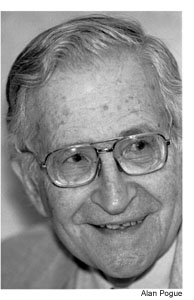The Back Page
No Small Bites
Something is happening here, and you don’t know what it is…
“The country is lonely,” Duke historian Larry Goodwyn told a group of progressive activists who came to Austin ten years ago in one of several failed attempts to organize the left. Goodwyn’s poetics implied that there was a political movement waiting to happen—if only it could be organized.
Goodwyn spoke to 250 people at a South Austin hotel. When left intellectual and author Noam Chomsky stood up to speak on October 20, the 1,000 seats in the basement auditorium of U.T.’s Sid Richardson Hall were filled. As were the aisles, the hallway behind the auditorium, and an overflow auditorium where the speech was telecast. As the crowd grew, U.T. journalism professor Bob Jensen announced that speakers had been set up in the breezeway.

The crowd of about 2,500 was also distinct from those brought together by Jim Hightower and Larry Goodwyn ten years earlier: liberals who defined the left of the Democratic party and came together in Hightower’s campaigns for elected office; the ACLU; and the subscriber list of this publication.
This event was defined by a younger crowd, most of whom could care less whether John Sharp defeats David Dewhurst or if Kirk Watson is the state’s attorney general. Although they came to the University of Texas campus, many of them are not students, but young activists already organized in anti-globalization and environmental organizations. The same politically engaged crowd that paid $10 a head to fill a 5,000-person sports arena (twice) when Ralph Nader spoke in Austin. The same people who came together to confront the IMF and World Bank in Seattle and Washington.
Scattered in the crowd were older activists working together since Ronald Reagan’s terrorist campaigns in Central America. But this was not their event either. While Goodwyn’s observation ten years earlier suggested there was a political movement waiting to be organized, were he present this Sunday morning he might have observed that there already is a movement we somehow fail to see.
Chomsky told the gathering that while American power is global in its reach and terrifying in its destructive capacity, it is fragile and responds to persistent pressure from the public in this country. He spoke for two hours and is not exactly given to sound bites. What follows is a brief take on his analysis of why George W. Bush is pushing the country toward war with Iraq.
The National Intelligence Council, which I’m quoting, of course had a lot to say about the Middle East. They say that there will be a rise in demand for energy and they point out that that’s going to undermine the Kyoto Protocol—whether W signs it or not. They predict more rapid global warming, which is another threat to survival, but kind of rational within the lunatic framework that this planet’s in now. But speaking of the Persian Gulf, they say the region is one of the main energy sources in the world. They say that the Persian Gulf region will see large increases in oil-production capacity and will rise in importance in the world energy market. So it follows that the United States has to control it as it has done since World War II, when we kicked out France and reduced Britain to a kind of tenant. They also point out that the United States itself is not going to rely on energy from this source. The U.S. will use more secure sources in the Atlantic Basin: Latin America and West Africa. But that doesn’t change. That’s been true. The issue is not access to oil. It never has been. That’s been true since World War II. Everybody in Texas ought to know that the United States, North America, was the largest oil producer right up until about 1970, when Middle East oil still wasn’t needed.
But nevertheless, up until this period, the U.S. had to control the Persian Gulf. It didn’t care about the oil. It wanted to control it. There are good reasons for that. Back in the 1940s, the State Department pointed out that Persian Gulf oil is the greatest material prize in the world’s history and a stupendous source of strategic power.
Well, the greatest material prize in the world’s history means that whoever controls it gets profits “beyond the dreams of avarice” to quote the standard history of the industry. And that doesn’t mean just oil company profits. It also means all kinds of petro-dollars flowing into the U.S. economy….
So you’ve got to control it because of profits beyond the dreams of avarice. But also it’s a stupendous source of strategic power. And that’s crucial. Strategic power means it’s a lever of world control. If you have your hands on Persian Gulf oil you can control the world.


